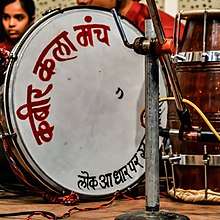Kabir Kala Manch
Kabir Kala Manch was a cultural organisation that was formed in Pune, Maharashtra, India, in the wake of the Gujarat riots in 1992. Through music, poetry and theatre, it aims to spread an anti-caste, pro-democracy message.[1] It comprises students and young professionals who perform protest poetry and plays in slums and streets.
 | |
| Abbreviation | KKM |
|---|---|
| Formation | 1992 |
| Type | Cultural organisation |
| Headquarters | Pune, Maharashtra, India |
| Location | |
Region served | Maharashtra |
Official language | Marathi, Hindi |
History
After the Gujarat riots of 1992[1], a group of students came together and formed Kabir Kala Manch, a cultural group which, through their music and poetry, took up the cause of social inequality, exploitation of the underclasses, farmer suicides, female infanticide, Dalit killings and the widening net of corruption.
Some of the performances of the Kabir Kala Manch have been featured by Anand Patwardhan in his documentary Jai Bhim Comrade.[2][3]
Allegations of Naxalite links
Kabir Kala Manch activists were arrested under the Unlawful Activities (Prevention) Act as being "Maoists" and "Naxalites" by the Government of Maharashtra. In May 2011, a crackdown by the Anti-Terrorism Squad on musicians and poets accused of promoting Maoist or Naxalite ideology led to Sheetal Sathe and other members of Kabir Kala Manch going into hiding.[4][5]
On 2 April 2013, Sheetal Sathe and her husband Sachin Male, also a member of KKM, came out of hiding from the police in Mumbai while maintaining that they were innocent of the charges and insisting their act did not constitute "surrender",[6] after two members of KKM, Deepak Dengle and Siddharth, were granted bail by the Bombay High Court.[7] But in spite of her pregnancy, Sheetal, along with her husband, were denied bail immediately and again on 4 June 2013 by the Mumbai Sessions Court.[8][9] She was finally granted bail by the Bombay High Court on 28 June 2013 on humanitarian grounds.[10] On 3 January 2017, the remaining arrested members of the group — Sachin Mali, Sagar Gorkhe and Ramesh Ghaichor — were granted bail by the Supreme Court of India.[11]
Attack on KKM members
KKM members along with the event's organisers, were attacked by the members of Akhil Bhartiya Vidyarthi Parishad after their performance at National Film Archive of India (NFAI), organized by the students of Film and Television Institute of India, Pune.[12]
Sheetal Sathe
Sheetal Sathe is a folk singer, poet, and Dalit rights activist from Pune, Maharashtra, who rose to prominence within as one of the lead singers of Kabir Kala Manch in the mid-2000s.
From 2007, documentary filmmaker Anand Patwardhan filmed Kabir Kala Manch performances and interviewed Sathe extensively while gathering footage for Jai Bhim Comrade, a film about caste tensions and violence stemming from the police killings at Ramabai Nagar, Mumbai in 1997. Jai Bhim Comrade was finally released in 2011, according to Patwardhan, "so that people like Sheetal can come out in the open again and prove that they hadn't done anything wrong, anything more than speak up for the powerless”.[13][3] The film, which was screened in colleges and universities around India, introduced Sathe's music and message to an audience outside Maharashtra.
Popular Works
- Aye Bhaghat Singh Tu Zinda Hai Har Ek Lahu Kay Katray Main.
References
- "Kabir Kala Manch creates awareness through dramatics". DNA India. 28 March 2010.
- "A film with a difference". The Hindu. 28 January 2012.
- "A Song that will be Sung". Tehelka. 28 April 2012.
- "Former FC girl student, now wanted for 'Maoist' links". Indian Express. 11 April 2012.
- "The thin line between dissent and rebellion : Why is a radical Dalit cultural group and its members being persecuted in Maharashtra?". Tehelka. 20 April 2013.
- "Democracy needs their song". The Hindu. 5 May 2013.
- "Two activists suspected to be naxals by ATS surrender near Vidhan Bhavan". Hindustan Times. 3 April 2013.
- "Why is this woman still in jail?". Tehelka. 15 June 2013.
- "Pregnant 'Maoist sympathiser' denied bail". Indian Express. 5 June 2013.
- "HC grants bail to suspected Naxal Sheetal Sathe". DNA India. 28 June 2013.
- "After Three Years in Jail, India's 'Most Dangerous' Singers Finally Make Bail". The Wire. Retrieved 4 January 2017.
- "ABVP thrashes FTII student for not saying 'Jai Narendra Modi'". The Hindu. 24 August 2013.
- "A film with a difference". The Hindu. 28 January 2012.